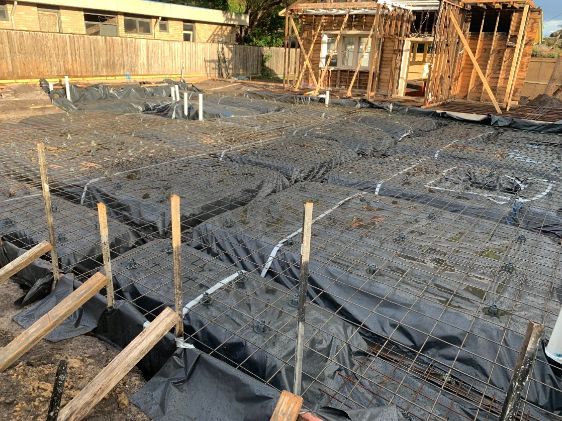Yes, you’ll need to rebar a concrete driveway to give the slab strength and to prevent cracking. By incorporating reinforcement bars, the strength of a concrete slab is increased, allowing it to sustain heavy vehicles and machinery.
In areas where the soil is prone to shifting, reinforcement bars can be a valuable addition to driveways. This is because they secure the concrete slab and guard against potential damage caused by soil movement.
At Complete Concrete Frankston, we highly suggest seeking guidance from a specialist when constructing a concrete driveway.
In this post, we will familiarise ourselves with the fundamentals of reinforcement bars and address the frequently asked questions related to their usage in concrete driveways.
What is Rebar?
Reinforcement steel, also known as rebar or reinforcing steel, is a carbon steel bar employed to strengthen concrete structures. It is regularly used in construction to provide extra robustness and stability to the building.
When applied in concrete driveways, rebar serves to bind the material and deter compression. Typically, it is arranged in a lattice-like design and is inserted by concrete workers whilst they construct a concrete driveway.

When Is Rebar Necessary in a Concrete Driveway?
Rebar or reinforcing steel is always required in concrete driveways. Using steel in your driveway will ensure:
- It will endure heavy loads: Driveways that are prone to accommodating heavy vehicles or frequent use may benefit from the added support of rebar.
- Its dimensions necessitate reinforcement: Larger driveways or those with intricate designs may require reinforcement with rebar to maintain stability.
- It’s constructed on shifting or settling ground: Concrete driveways may benefit from the use of rebar if they are situated in areas where the soil regularly shifts or settles.
Types of Rebars for Concrete Driveways
The various forms of driveway rebar include standard, stainless steel, galvanised, and epoxy-coated rebar.
Standard rebar is usually used in most domestic driveways and is made of carbon steel. Meanwhile, stainless steel rebar is relatively expensive due to its anti-corrosion properties and, therefore, not recommended for domestic use because of its high cost.
Finally, galvanised and epoxy-coated rebar are metal rods that exhibit greater resistance to corrosion and are engineered to perform better against the elements.
What If I Don’t Use Rebar in My Concrete Driveway?
Omitting rebar in a concrete driveway that requires it will result in a weak and unsteady surface susceptible to cracking. Such damage can easily allow water inside the concrete. The presence of water underneath the concrete slab can cause harm to the structure over time.
The good news is that rebar can prevent this from happening. The added reinforcement can provide you with a stable and durable surface for your driveway.
Moreover, soil movement can affect concrete driveways, but rebar installation can keep the concrete intact and prevent it from separating.You can learn how many years concrete driveways last by reading our post about it here.
